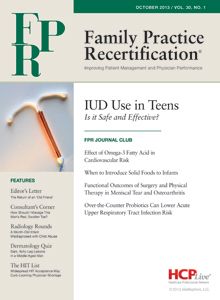Publication
Article
Family Practice Recertification
When to Introduce Infants to Solid Foods
Author(s):
At what age should solid foods be introduced to infants in order to alter their risk of atopic disorders?
Frank J. Domino, MD
Review
Nwaru BI, et al. Timing of infant feeding in relation to childhood asthma and allergic diseases. J Allergy Clin Immunol; 2013;131(1):78-86. http://www.jacionline.org/article/S0091-6749(12)01696-X.
Study Methods
This was a prospective cohort study of 3,781 consecutively-born children in Finland. Their dietary exposures were categorized and analyzed for their risk of developing asthma, allergic rhinitis, and atopic eczema using the International Study of Asthma and Allergies in Childhood Questionnaire.
Patient Demographics
Of all Finnish patients, 68% did not have asthma, though 52% had allergic rhinitis. Eighty-nine percent of mothers did not smoke during their pregnancies.
Results and Outcomes
Total, yet not exclusive, breastfeeding for 9.5 months or less after birth was associated with an increased risk of asthma. Though the introduction of wheat, rye, oat, or barley cereals at or after 5.5 months of age was associated with a decreased risk of asthma and allergic rhinitis, introducing those foods sooner than 4.5 months of age increased the risk of atopic eczema. Additionally, the introduction of egg at or before 11 months of age lowered the risk of asthma, allergic rhinitis, and atopic sensitization, while the introduction of fish at or before 9 months of age was associated with a lower risk of allergic rhinitis and atopic sensitization.
Conclusion
Breastfeeding for more than 9.5 months may lower an infant’s risk of developing asthma, while introducing egg and fish before 9 months of age and waiting to introduce cereals until 5.5 months of age may help lower the risk of some atopic disorders.
Commentary
This observational study describes the potential risks and benefits of the timing of certain foods and atopic disorders. While the findings support various recommendations, they don't prove how feeding practices impact future illness.
In 2012, the American Academy of Pediatrics (AAP) recommended that all infants be breastfed exclusively until they reach the age of 6 months1, and this paper supports that position. The AAP recommendation to continue breastfeeding for at least another 3.5 months as other foods are introduced is also supported here.
There is a small amount of data concering the feeding of infants and the prevention of atopic disorders with the use of prebiotics and probiotics, but the sole systematic review-level data only speaks to breastfeeding as a protective measure.2
Going forward, physicians should encourage breastfeeding for at least 9.5 months, recommend adding in cereal after 5.5 months, and suggest bringing fish and eggs into the diet at some point before the infant reaches 9 months of age.
References
1. Eidelman AI, Schanler RJ, et al. Breastfeeding and the use of human milk. Pediatrics. 2012;129(3):e827. http://pediatrics.aappublications.org/content/129/3/e827.full
2. Kramer MS, Kakuma R. Optimal duration of exclusive breastfeeding. Cochrane Database Syst Rev. 2012 Aug 15;8. http://onlinelibrary.wiley.com/doi/10.1002/14651858.CD003517.pub2/abstract;jsessionid=13EA2994F40B6A8F583E9FFC3188D672.f02t03.
About the Author
Frank J. Domino, MD, is Professor and Pre-Doctoral Education Director for the Department of Family Medicine and Community Health at the University of Massachusetts Medical School in Worcester, MA. Domino is Editor-in-Chief of the 5-Minute Clinical Consult series (Lippincott Williams & Wilkins). Additionally, he is Co-Author and Editor of the Epocrates LAB database, and author and editor to the MedPearls smartphone app. He presents nationally for the American Academy of Family Medicine and serves as the Family Physician Representative to the Harvard Medical School’s Continuing Education Committee.






